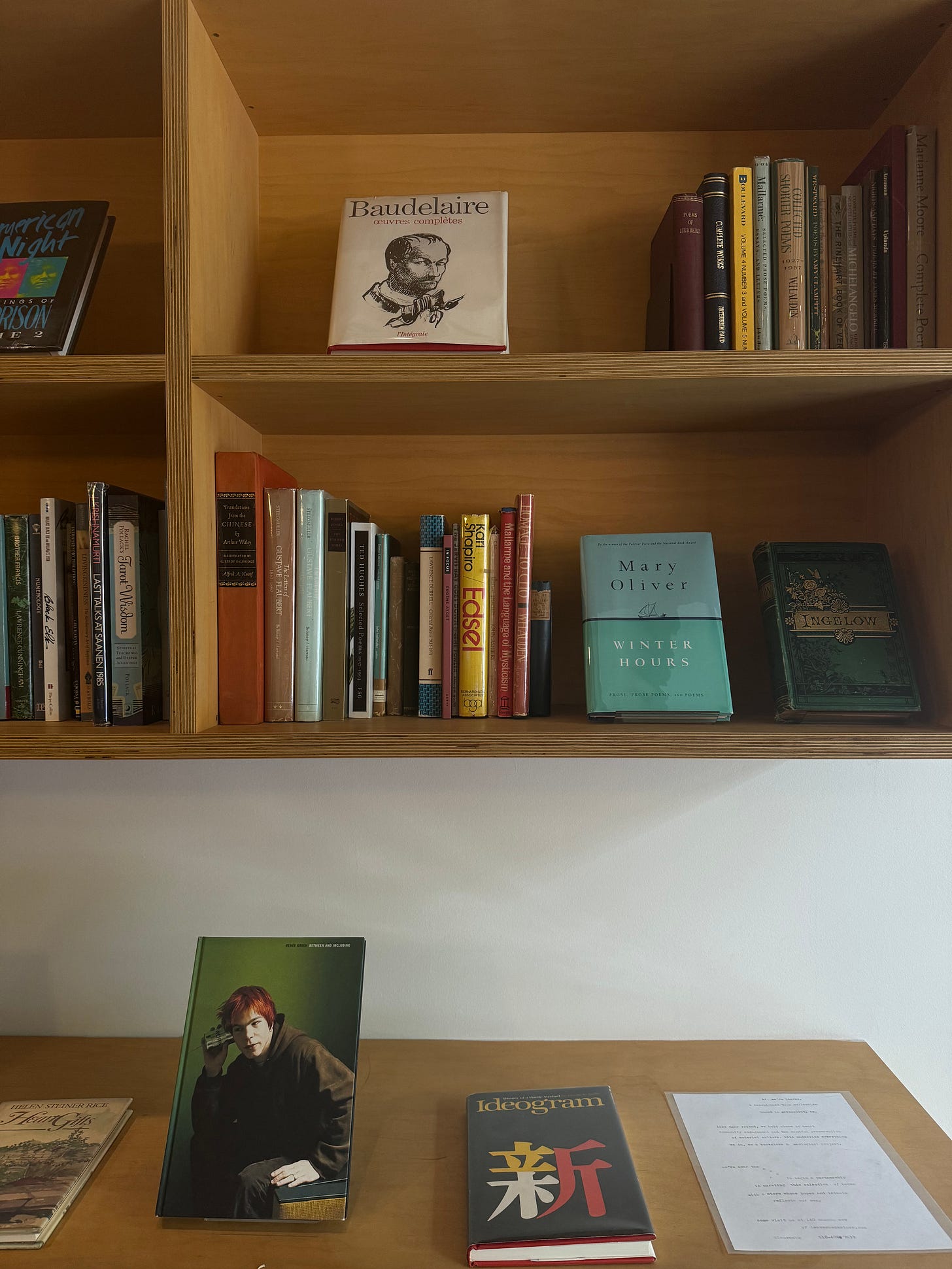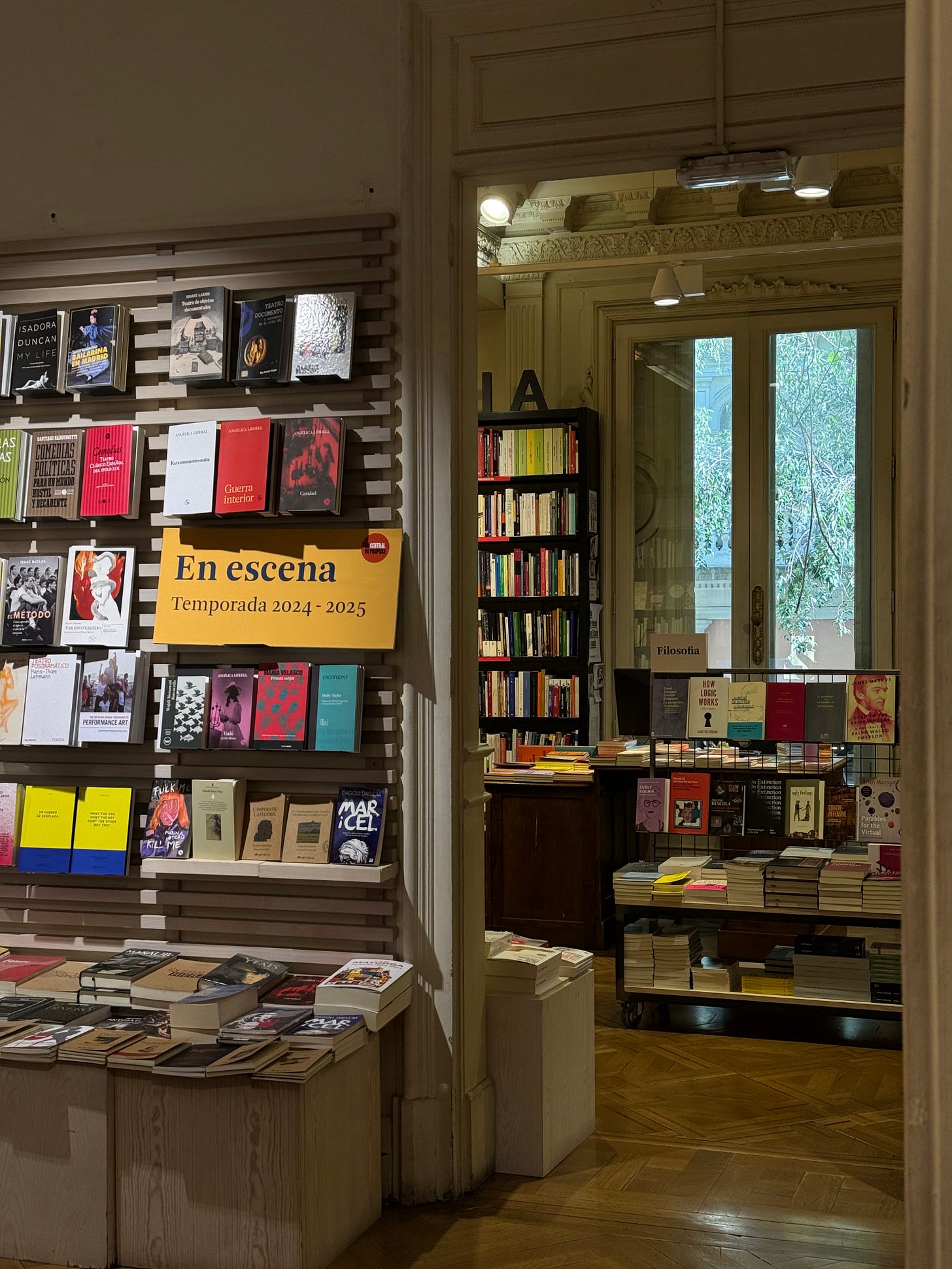I’m a library power user and evangelist. I’m a book collector who complains about Amazon every chance I get. My third place of choice? Independent bookstores. And yet, these days, I’m also an AmazonKindleTM reader, equal parts guilty and adoring whenever I fire up my Kindle’s laggy greyscale screen. I guess I contain (disappointing) multitudes!
One thing about me is I will willingly surrender precious hours of my life to mind-melting scrolling sessions on socials if I don’t keep up with a reading habit. Since my Kindle is small enough to bring anywhere I’d bring my phone, it plays a crucial role in keeping a daily reading streak alive while protecting my tiny dopamine stores.
This past July, I quit my job, sold my house in Seattle, packed up my collection of real books, and set out roadtripping with Bryan and our dog, Wadsworth. We traveled through the United States saying our goodbyes before moving to Spain for an indefinite amount of time. Of everything I packed into two suitcases and a backpack, my Kindle earned the top spot for most useful belonging.
I’ve already finished one chonky book and I have a few more queued up, ready to read (hello, Throne of Glass series). Together, these books represent thousands of pages and yet, take up hardly any physical space in my luggage. This is what readers packing up their things and moving every few weeks want from technology! Not AI cosplaying as customer support reps for airlines and hotels.
Despite my ebook consumption habits, I still treasure physical books. In each of the ten cities we visited this summer, my idea of tourism was dragging Bryan and Wadsworth into independent bookstores “just to look” since I couldn’t fit even one more physical book into my luggage if I tried. My favorite way of getting to know a new city is through its bookstores and libraries. I have no doubt the strangers visiting and staffing these places, no matter the city, could turn into my people, if given enough time.
Although, I often wonder what these people, my-hypothetical-people, would say if they knew I was a traitor who bankrolls Bezos the Bookgeyman by reading on a Kindle. All seven ounces of this device sit in my bag heavier than a copy of Priory of the Orange Tree, reminding me how I contributed, in a small way, to the monopolized waters indie bookstores must tread to stay afloat.
Granted, I’m sure by now, 17 years after the first Kindle release, it’s understood that readers aren’t choosing Kindles because they want to see independent bookstores fail. All ereaders, not just Kindles, offer increased access to readers of all kinds: an adjustable font for people who experience difficulty reading small print, the ability to check out books from the library without leaving home, and weightless books for students with aching backs and travelers packing light.
If physical books must be substituted, I assume “the book people,” like indie bookstore owners, would prefer for readers to choose a Kobo or an iPad over a Kindle since they provide all of the same benefits without supporting a corporation that put 43% of US independent bookstores out of business.
I find US bookstore stats to be all over the place but it’s clear the indie bookstore glory days were the late 80s and early 90s. In those years, the United States was home to around 4,000 independent bookstores. By 2011, only 1,900 were left. Today? Only 2,844 independent bookstore locations remain in the US.
We should celebrate the partial bounce-back we’ve seen since 2011, but it’s hard not to dwell on an alternate reality where Amazon hadn’t gobbled half of the US print book market, amassing an annual revenue of $28 billion along the way. It’s easy for me to believe independent booksellers would be numerous and thriving if Amazon’s $28 billion in yearly revenue were dispersed more evenly across the entire bookselling industry.
I know, something something innovation, something something capitalism, lower prices, blah blah blah. Maybe it’s true that the struggle independent booksellers face today is an inevitable eventuality in every branch of the multi-verse. In another universe, if big box bookstores were given the chance to grow unchecked by Amazon, economies of scale might still drive prices down to a level difficult for independent booksellers to challenge.
Then again, in another universe, intelligent beings with the ability to read and write might not know what a big box bookstore is at all. Maybe they favor an oral tradition to share stories or they built a gift economy for the exchange of goods. Maybe in that universe, convenience isn’t queen, connection is, instead?
Back on planet earth, I have hope for a future where books are no longer bought from the “the everything store.” I have hope because I watched independent bookstores survive despite major threats in my lifetime: the Barnes & Noble days, Amazon bookstores (a failed experiment over seven years), and a global pndm*c that changed the way people engaged with booksellers altogether.
The quarantine years reminded us how rare the bookstore-atmosphere-effect can be and the importance of protecting physical spaces such as these from extinction. Time behaves differently in the presence of humanity’s collective wisdom. Bookstores are portals, liminal spaces between the living and the dead. Booksellers offer books, but in doing so, they also offer possibility, hope, knowledge, safety, adventure, healing, and community to the places they serve.
My first Kindle was gifted to me nearly a decade ago. When it stopped charging, I spent my own money to upgrade to a Paperwhite. I can’t deny I use it often and in doing so support a megacorp responsible for the closure of thousands of small businesses I would have rather seen succeed. However, it’s also true (and more fun) to say the blame lies not on individual consumers “voting with their dollar,” but with our government for allowing Amazon to monopolize e-commerce and publishing in broad daylight.
Despite my belief that there is no ethical consumption under capitalism, if I were given the choice to buy a new Kindle today, it would be a hard pass for me. Both emphatically and with difficulty, since I’ve grown reliant on it. It becomes less difficult, however, when considering headlines about the nearly $300 Colorsoft models being held up due to “severe quality issues” only three weeks after launch.
So, what’s the verdict? How can someone who says they come alive in small bookstores also say they read on a Kindle with a straight face? Amazon’s malfeasance in the publishing realm is well known in 2025. Would I be shunned by my independent bookstore owning idols for reading on a device that continues to threaten their livelihood?
I don’t know but I hope not. I like to think people who choose this line of work are better poised than the average human to face a dichotomy such as mine with patience and compassion. I would also understand if that weren’t the case. Everyone I know is doing their absolute best while watching the world (literally) burn. In my book, a shared love for reading, no matter what form it takes, should be enough to forge solid connections. One can always do better.
Let this post be a public promise to do my part in keeping small bookstores alive as a two-faced reader. I promise to continue frequenting indie bookstores for gifts, trophy copies of my favorites, cookbooks, art books, and bookclub picks. I promise to show up for community events like author readings and workshops. For extra penance, I solemnly swear to never give up talking people out of their prime memberships.













Kathleen Kelly didn’t run scared from the bookgeyman either. Fight the good fight, just keep reading.
“Bookgeyman” 🤣🤣🤣 I love this and feel it on so many levels!! A frequent travel myself, my kindle is always with me too but I neverrrr pass up a cutie bookstore 🥹